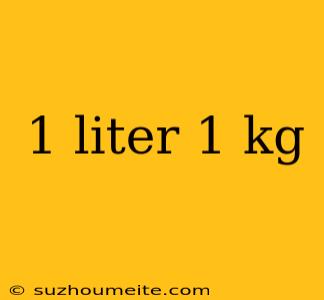1 Liter vs 1 Kilogram: Understanding the Difference
Many people often get confused between 1 liter and 1 kilogram, thinking that they are interchangeable units of measurement. However, this is not the case. In this article, we will explore the differences between 1 liter and 1 kilogram, and when to use each unit.
What is 1 Liter?
A liter is a unit of volume, primarily used to measure the volume of liquids. It is defined as one cubic decimeter or 1,000 cubic centimeters. In everyday life, we often use liters to measure the volume of liquids such as water, milk, and juice.
What is 1 Kilogram?
A kilogram, on the other hand, is a unit of mass or weight. It is defined as the mass of the International Prototype of the Kilogram, a platinum-iridium alloy cylinder stored at the International Bureau of Weights and Measures in France. One kilogram is equal to 1,000 grams or 2.20462 pounds.
Key Differences
The main difference between 1 liter and 1 kilogram lies in what they measure. A liter measures volume, while a kilogram measures mass or weight. This means that 1 liter of a substance does not necessarily weigh 1 kilogram.
Real-Life Examples
To illustrate the difference, let's consider some examples:
- 1 liter of water weighs approximately 1 kilogram, because the density of water is close to 1 gram per cubic centimeter. However, 1 liter of gasoline, which is less dense than water, weighs around 0.7 kilograms.
- A 1-kilogram bag of sugar may occupy a volume of more than 1 liter, depending on how densely the sugar is packed.
Conclusion
In conclusion, while 1 liter and 1 kilogram may seem like similar units of measurement, they serve different purposes and are used in different contexts. Understanding the difference between these two units is essential for accurate measurements and conversions in various fields, including science, engineering, and everyday life.
